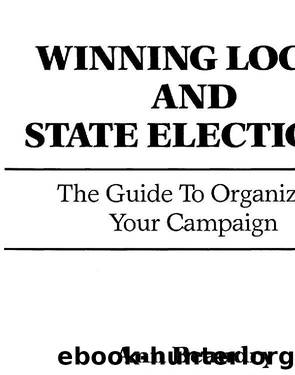Winning Local and State Elections by Ann Beaudry

Author:Ann Beaudry
Language: eng
Format: epub
Publisher: The Free Press
The Press Secretary
Dealing with the press is one of your campaign’s toughest jobs. Many different activities must be coordinated on very tight deadlines. Generally, supervision of all facets of media relations is assigned to a single staff person who is most often given the title of press secretary.
Someone who knows the ropes and has established personal relationships with some members of the local press is likely to be the best person to handle this important responsibility. Consider press aides from previous campaigns or media coordinators from citizens’ groups in your area. Journalism faculty and recent graduates from college public relations programs also have great potential for this role.
The press secretary must be a person with multiple skills. Most important are the abilities to recognize news, write effective releases quickly, and convince reporters that stories are worth covering. Whoever is chosen must be a person the candidate trusts completely since the press secretary will play an important role in establishing the campaign’s public image and credibility.
Execution of the media plan allows many roles for volunteers working under the direction of the press secretary. List maintenance, monitoring coverage, telephoning, and typing can all be done at home or at headquarters by volunteers, but to avoid errors and confusion, the campaign cannot have a host of spokespeople. The press secretary should be the only person besides the candidate, and possibly the campaign manager, who talks with reporters and editors. If volunteers are assigned any direct media contact work, they should be thoroughly briefed and provided with written scripts for making phone calls.
For everyone working with the media, there are basic rules of behavior. Reporters will be more inclined to give favorable coverage to campaigns that treat them as professionals and help them do their difficult jobs more effectively. Here are some of the most important guidelines:
• The cardinal rule is always tell the truth. If you don’t know the facts, admit it. Promise to check details and get back quickly with accurate information.
• Keep the candidate informed. Never put out a press release that the candidate has not seen and approved. The candidate should never be caught off guard by a reporter’s question about a campaign story he or she is not familiar with.
• Remain accessible at all times. Return phone calls promptly so reporters can meet deadlines. Be polite when contacted at home, late at night, on holidays, or weekends.
• Know the rules. Recognize that all conversations with reporters and editors are “on the record” with both your name and every word you say subject to publication unless you and the journalist agree otherwise before you begin talking. “Not for attribution” is for occasions when you don’t want your name in the paper but don’t mind the use of an anonymous quote from “a campaign official.” “Background” means the information may be used, but not quoted or attributed to any source. Finally, “off the record” means the information may not be printed or broadcast in any manner.
• Be aggressive. A late story is no story at all.
Download
This site does not store any files on its server. We only index and link to content provided by other sites. Please contact the content providers to delete copyright contents if any and email us, we'll remove relevant links or contents immediately.
The Secret History by Donna Tartt(19010)
The Social Justice Warrior Handbook by Lisa De Pasquale(12179)
Thirteen Reasons Why by Jay Asher(8878)
This Is How You Lose Her by Junot Diaz(6865)
Weapons of Math Destruction by Cathy O'Neil(6253)
Zero to One by Peter Thiel(5774)
Beartown by Fredrik Backman(5720)
The Myth of the Strong Leader by Archie Brown(5484)
The Fire Next Time by James Baldwin(5418)
How Democracies Die by Steven Levitsky & Daniel Ziblatt(5207)
Promise Me, Dad by Joe Biden(5135)
Stone's Rules by Roger Stone(5070)
A Higher Loyalty: Truth, Lies, and Leadership by James Comey(4942)
100 Deadly Skills by Clint Emerson(4902)
Rise and Kill First by Ronen Bergman(4766)
Secrecy World by Jake Bernstein(4733)
The David Icke Guide to the Global Conspiracy (and how to end it) by David Icke(4691)
The Farm by Tom Rob Smith(4494)
The Doomsday Machine by Daniel Ellsberg(4477)
